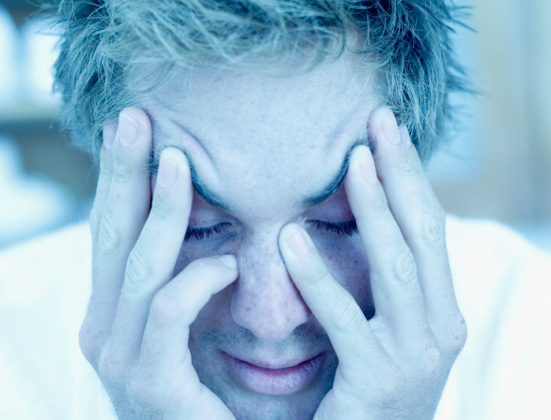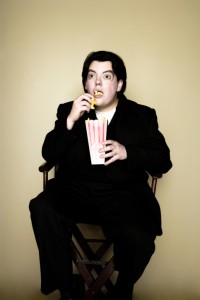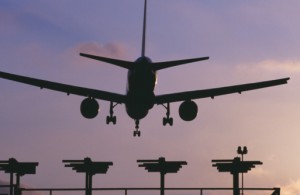You may well have heard by now that five U.S. air-traffic controllers — a rather shocking number — have been found literally asleep at the switch on the overnight shifts of several U.S. airports just since late March. So many — including a supervisor — that federal transportation secretary Ray LaHood has ordered that a minimum of two controllers be on duty at those airports where a decent number of flights land after dark.
LaHood has used words like “ridiculous” and “outrageous” to discuss the on-the-job naps and other embarrassing lapses by controllers. They included an incident at Cleveland’s air transportation center in which a controller who was watching a movie — let me say that again: he was watching a MOVIE on a DVD player — while planes were landing, couldn’t be reached by the incoming pilots. He compounded his apparent stupidity by leaving his microphone open for three minutes while the soundtrack from the movie blared into the pilots’ headphones.
Another controller, allegedly, was so cavalier about his duties that he set up pillows in the control tower on which to snooze. But others apparently just nodded off, almost certainly not deliberately, since they surely knew the hot water they’d be in if this were discovered.
Hotter still if a tragedy resulted.
I found this series of incidents particularly interesting because the radio broadcasts of a couple of sports teams that I follow in Washington, D.C., are sponsored, in part, by the National Air Traffic Controllers Association. The commercials repeat the union’s slogan: “NACTA — We guide you home.” They include reassuring messages about passenger safety under their watch. A recent one described an incident in which an alert controller averted a possible collision of giant airliners approaching Boston.
Not surprisingly, NACTA President Paul Rinaldi applauded the decision to add controllers in towers at “slow” times when dozing off might be most tempting.
And he supported efforts by the Federal Aviation Administration to reduce the chances that fatigue would overcome controllers on the job, especially in the dead of night, when humans are conditioned to crave sleep. As I understand it, these involve, or will involve, some adjustments of work shifts and prohibitions against certain kinds of shift-swapping. The idea of switching with a colleague to take a couple of shifts in a 24-hour period in order to lengthen your own weekend with an extra day off — a fairly common practice in many fields — wouldn’t seem to be the wisest of moves if the extra-long day puts a controller or truck driver or security sentry to sleep on the job.

Trading work schedules is common, and it often leads to double-shifting with little turnaround between shifts. (Thinkstock LLC)
The government announced, as well, that it is giving air-traffic controllers an extra hour off between shifts when they DO double-shift in a 24-hour period, as if that would somehow keep them from dozing off at work. One hour! “On my watch, controllers will not be paid to take naps,” Secretary LaHood said, even though the FAA’s own “fatigue working group” said a short power nap is precisely what’s needed to counteract the job’s tedium.
I have a friend and former radio colleague, Jim Slade, who’s now retired from a distinguished career as the aviation and space correspondent for ABC-TV and radio, CNN, and other national networks. He’s also a former pilot, so I asked him to weigh in about all this.
“ATC [air-traffic control] is one of the country’s highest-pressure jobs,” Jim told me. “Anybody shifting regularly among all the day parts must really feel it. Just look: you’re already wrung out from daytime/evening operations and then, without much rest, suddenly find yourself on the graveyard shift. FAA has never adequately addressed this nasty job in its entirety except to allow for an early retirement age owing to burnout. I’m really sorry for these guys.” He added:
I remember those nights when I substituted for Larry King on the all-night [national radio talk show]. At the end of a week, I was exhausted. Imagine the controller with hours of absolutely nothing going on and then having to shift to peak performance in a matter of seconds. They have all my sympathy.
Jim, for one, thinks the FAA should simply close all but the biggest regional airports — even relatively small fields like busy Ronald Reagan Washington National Airport — at 11 p.m. and reopen them at 5 the next morning. That would certainly eliminate much of the overnight controller staffing problem.

You can’t blame the traveling public for being alarmed about all this. Although pilots can often take off and land without a lot of specific help other than keeping a safe distance from other planes, they need careful guidance to gates and across runways from local controllers, especially in the wee hours when so many cleaning and maintenance and catering crews are buzzing about a big airport.
I’m neither a pilot nor a reporter who’s covered aviation issues. I haven’t even played a pilot in the movies. So I’m not qualified to go much deeper into the controllers-in-z-time matter. The FAA and NACTA, as well as pilots and controllers on various aviation blogs, are hashing this out quite vigorously without me.

On some jobs, you can sort of hide being asleep. But not in a control tower. (Dynamic Graphics, 2007)
But I do have some thoughts about “sleeping on the job” — words that have become a metaphor for all kinds of careless, slipslod behavior.
The other day, I happened to see one of our building security guards on duty in the dark and dingy bowels of the building, at a check point outside the entrance to (and, of course, exit from) a little-used underground tunnel to another government building.
She was wide awake, I should point out.
But as I looked at her while waiting for an elevator, I got to wondering whether I could stay awake in such a place that was not only remote, windowless, and quiet but also bathed in the steady hum of nearby pipes and electrical equipment.
I don’t think I could.
And I wondered about the many, many other guards, night clerks, and night-shift workers in similarly isolated and cozy settings. How in the world do THEY stay awake? Most — including our guard force — are not allowed to play music, read the newspaper or do crossword puzzles, or listen to the radio, since it would distract them from keeping watch or doing the books, or whatever they’re being paid to do.
I have a friend who, unfortunately, suffers from sleep apnea, to the point that he dozes off in the middle of his own sentences. And no wonder, since he never sleeps through the night.
He’d last about five minutes at that basement guard post before conking out. And of course he’d never be hired as an air-traffic controller. At least one would hope not.
I know how I feel after ONE night of restless sleep or none at all. Lousy. Dragging. And ready, oh so ready, for bed.
The people who work these graveyard shifts must have days when they haven’t rested, have had strenuous and tiring activities, or have downed more than a few beers before they reported for duty in sepulchral surroundings.
How DO they stay awake? Mind games, like some prison lifer? Jumping jacks at their posts?
Here are some suggestions for staying awake on the job that I’ve read. I’ll follow them with my reactions in italic:
• Take a break by getting up and walking around every half hour at least. Go get a drink, go to the bathroom, the copy machine/printer, wherever. That works once or twice if you find yourself falling into the arms of Morpheus, but people such as our lone VOA security guard or an airport controller can’t go strolling very far or very often.

• Drink coffee or a soft drink to pump some caffeine into your system. Been there and done that — and popped highly caffeinated pills call “No-Doz” as a college student cramming for a big examination. I found that stimulants keep your nerves jangling and your eyes open, but they don’t help you think any more clearly. Unfortunately, the common advice given to sleepy drivers on the highway — don’t get wired on pills; pull over and take a refreshing nap — doesn’t work on some jobs. Napping could get you fired, or security horribly breached.
• Multi-task. Try to do more than one thing at a time to keep your mind engaged. Maybe. But again, on some jobs you’re SUPPOSED to keep your mind on one thing, not fiddle around with distracting activities.
• Don’t sit in the same position for extended periods. Move your head, arms, legs, body. Sounds easy, but how many times can you stretch in an eight-hour period?
• Surround yourself with strong scents. I think this was suggested by some aroma therapist, pitching products. A “strong scent” — gross OR pleasant — would drive me nuts after awhile. I might be awake, but I’d have anger-management issues!
• Massage your own head, the back of your neck, and your legs. That’s soothing, I’ll grant you. But is soothing what we’re looking for here?
• Take a power nap. Tell that to the transportation secretary.
• Expose yourself to bright light, preferably daylight. Not real practical on the graveyard shift. And you may have read my feelings about bright artificial light. As a prescription for sleepiness, this, too, would bum me out. I might be awake, but it’d be a really grouchy awake.

• (I love this one) Keep yourself UNcomfortable — cold, on your feet too long, seated awkwardly. That would build a more alert workforce, all right. A workforce of masochists.
• Don’t overeat. Avoid a big meal before your shift, and take little munchie breaks during it. This one makes some sense. Americans know what happens after they gorge on turkey, gravy, and pumpkin pie on Thanksgiving Day, then plop into an easy chair to watch football. It’s snore-time in a flash! Not a good plan if your job involves watching a radar screen or security cameras.
• Break the monotony with a little light exercise. I can just see our security guard doing pushups next to the magnetometer.
• Perk up your system. Splash your face with, or drink a glass of, cold water. After awhile, this cure would be worse than the sleepiness. Chew gum. Doesn’t exactly fit the crisp professional behavior expected on most jobsites. Brush your teeth! Good for your breath, but it would look really strange in the control tower.
If you’ve had one of these long, monotonous, lonely jobs, enlighten me. How did YOU stay awake? And tell me what you think about the snoozing controllers.

The bottom line: Stay Awake. Stay Employed. (Stockbyte)
Ted's Wild Words
These are a few words from this posting that you may not know. Each time, I'll tell you a little about them and also place them into a cumulative archive of "Ted's Wild Words" in the right-hand column of the home page. Just click on it there, and if there's another word that you'd like me to explain, just ask!
Falling into the arms of Morpheus. Falling asleep. In Greek mythology, Morpheus was the god of dreams.
Sepulchral. Tomblike, often dark and deathly quiet.
Slipshod. Sloppy, shabby, careless, halfhearted.






4 responses to “Air-Traffic Controllerzzz”
I’ve worked the graveyard shift for over ten years at a 24 hour call center. My mother worked overnights for 30 years. I’ve seen a lot of fellow employees try to cope with staying awake. It’s a personal battle that every person has to do on their own.
Most of these suggestions are for when you realize you’re sleepy at work. It’s not about short term fixes. It’s about living the life.
In my experience, people are going to fall asleep no matter what, at some time or another. Sometimes when the work slows down your mind slowly shuts down as well, “lost in your own thoughts”. It usually comes over you without your even realizing it. Sometimes it’s only a for a second, even while you are speaking with someone. You can even dream for a single second.
Your own body slowly tries to build itself a habit of sleeping, to where you even put your feet up, or lie down for a while. You have to watch for that.
It’s a learned skill, an effort of will to stay awake all night every night, and rotating shifts make it worse.
I’ve tried most of the tips above. they all work a little. None work every time. I’ll give you my opinion:
-Take a walkabout – Basically, you’re away from your post.
-Coffee. Caffeine is less effective used regularly – use it sparingly.
-multi task- If your job allows it, it helps to have another task to do. Rarely is the other task interesting however, which brings you back to sleepy. I’ve seen knitting, chessboards, writing and other personal tasks used successfully. Management never approves.
Power naps- They work best, but it’s a learned skill to fall deeply asleep during a 15 minute break with a kitchen timer on your chest. And you’ve got to be able to do it immediately, not walk somewhere 5 minutes away.
Don’t Overeat? Once in a while you get to go to a restaurant, and you’re not going to overeat? That’s a different kind of willpower.
Light exercise – You feel really foolish running in place while your coworkers watch you, but the distraction helps them too. It doesn’t work very well unless you get your heart pumping.
Sunlamps and strong scents might work, but not in any office environment I know of. Sunlight works, but it’s too late.
Stay uncomfortable? No. Not unless you want a backache too. Pain makes you less focused, not more.
I stayed awake because eventually my body adapted. It took years to get to that point. I could not fall asleep at night anymore, or stay awake during the day. I’d fall asleep on my way home at dawn because it was bedtime. Even then I’d have sleepy nights occasionally.
My tips:
-Working at night takes 8 hours of sleep. Make it a religion. Don’t try to cheat yourself very often. You pay for it for days.
I’d recommend some tips to supervisors:
-Performance is usually down for the night shift.Rarely is it working on all cylinders.
-Realize that the shift diff is earned. They’re working every minute.
-You’ve got to have a team of people, not just one. They reinforce each other with distractions, and they cover for each other when it’s inevitable.
Some people can do it. Some can’t.
Overnighters can appear to be quirky. They’ve developed skills and habits to cope.
You’ve got to realize that it’s an entire way of life. You’re a social outcast. All other “after dark” activities are curtailed. Very hard on marriages, and physically destructive of your body and mind. Expect to lose both earlier than normal.
As you can tell, I’m somewhat sympathetic to the sleepy controllers. Not enough to condone it, but enough to understand that it can happen to all of us normal people. As a habit, however, it’s not acceptable.
No one should be alone in that position at night. How would you take a break or lunch or do any of these techiques above? Remember you need all of them, as none work every time, and it sneaks up on you.
Always hated working nights ’cause unless you sleep all day you’re already tired by the time you show up for work. Did you stick me with a night shift? Don’t think so. Good to hear you…and see you.
—-ed
When Ed asks if I stuck him with a night shift, he’s referring to our brief time together at KFWB Radio in Los Angeles. That’s a nightowl town, for sure.
Ted
Really enlightening information about the sleep terrors of the night shift. Thanks, Roger. I’ll also copy your note to the Ted Landphair’s America Facebook page.
Ted